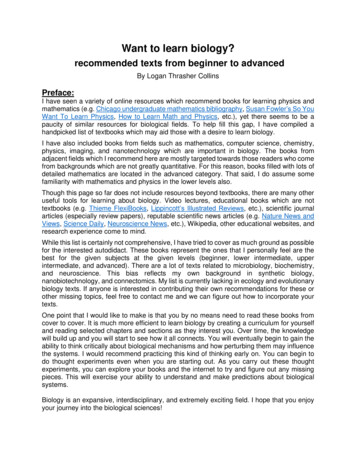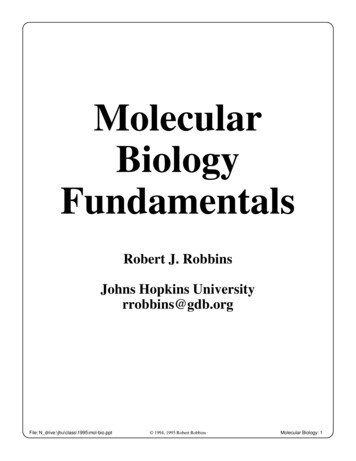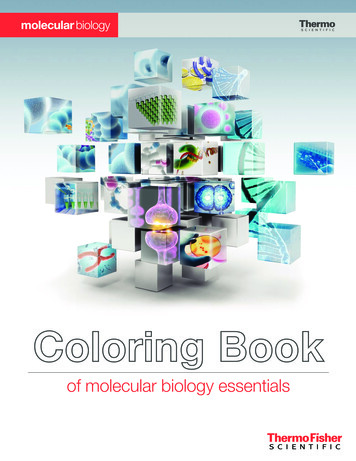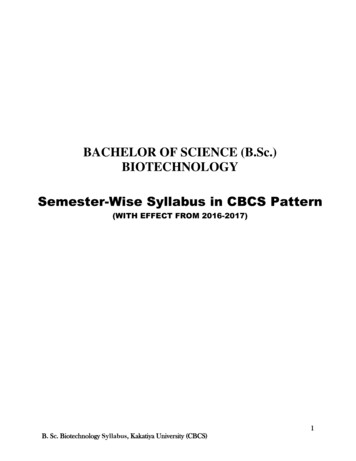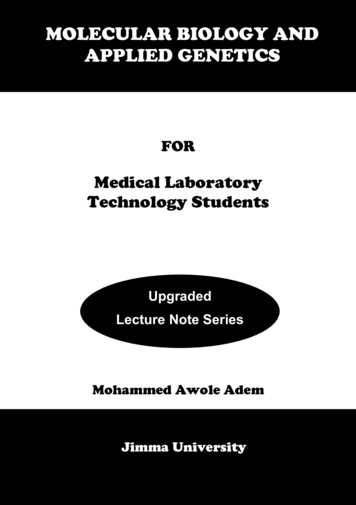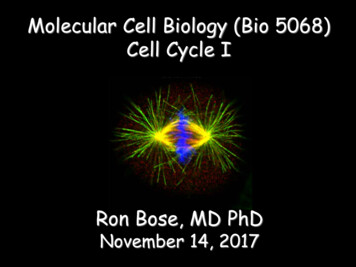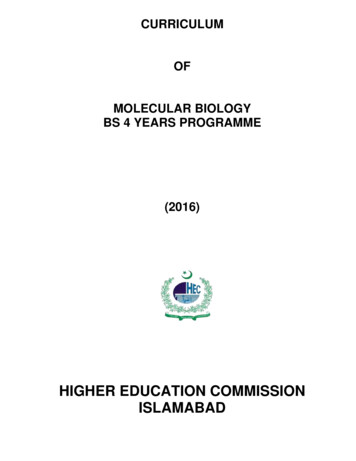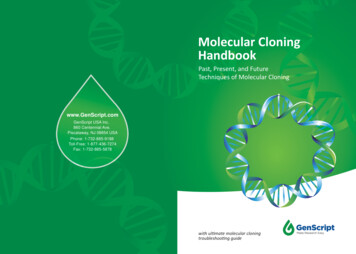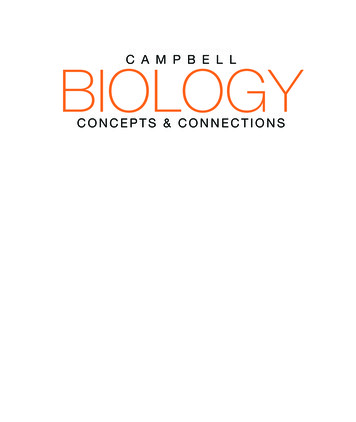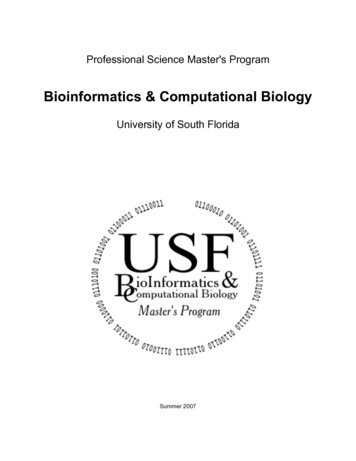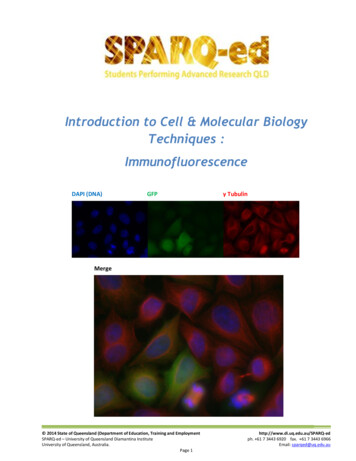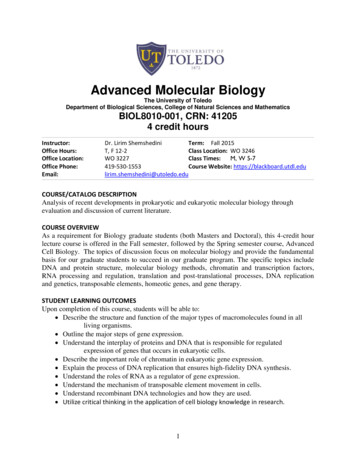
Transcription
Advanced Molecular BiologyThe University of ToledoDepartment of Biological Sciences, College of Natural Sciences and MathematicsBIOL8010-001, CRN: 412054 credit hoursInstructor:Office Hours:Office Location:Office Phone:Email:Dr. Lirim ShemshediniTerm: Fall 2015T, F 12-2Class Location: WO 3246WO 3227Class Times:M, W 5-7419-530-1553Course Website: do.eduCOURSE/CATALOG DESCRIPTIONAnalysis of recent developments in prokaryotic and eukaryotic molecular biology throughevaluation and discussion of current literature.COURSE OVERVIEWAs a requirement for Biology graduate students (both Masters and Doctoral), this 4-credit hourlecture course is offered in the Fall semester, followed by the Spring semester course, AdvancedCell Biology. The topics of discussion focus on molecular biology and provide the fundamentalbasis for our graduate students to succeed in our graduate program. The specific topics includeDNA and protein structure, molecular biology methods, chromatin and transcription factors,RNA processing and regulation, translation and post-translational processes, DNA replicationand genetics, transposable elements, homeotic genes, and gene therapy.STUDENT LEARNING OUTCOMESUpon completion of this course, students will be able to: Describe the structure and function of the major types of macromolecules found in allliving organisms. Outline the major steps of gene expression. Understand the interplay of proteins and DNA that is responsible for regulatedexpression of genes that occurs in eukaryotic cells. Describe the important role of chromatin in eukaryotic gene expression. Explain the process of DNA replication that ensures high-fidelity DNA synthesis. Understand the roles of RNA as a regulator of gene expression. Understand the mechanism of transposable element movement in cells. Understand recombinant DNA technologies and how they are used. Utilize critical thinking in the application of cell biology knowledge in research.1
TEACHING STRATEGIES-not essentialThis course is designed to stimulate student learning through lectures and reviews of relevantresearch papers. Powerpoint slides will be made available to students through Blackboard, withlectures using both the powerpoint slides and whiteboard. No lecture notes will be provided tostudents. Please be prepared when you come to class by completing any assigned readings andreading the appropriate chapters of the textbook.PREREQUISITESPrerequisite: Admission into the graduate program of the Department of Biological Sciences.REQUIRED TEXTS AND ANCILLARY MATERIALSAll the required material is provided by the instructor and will be uploaded in Blackboard beforethe class starts.TECHNOLOGY REQUIREMENTS-not essentialUNIVERSITY POLICIESPolicy Statement on Non‐Discrimination on the basis of Disability (ADA)The University is an equal opportunity educational institution. Please read The University’sPolicy Statement on Nondiscrimination on the Basis of Disability Americans with Disability ActCompliance.Academic AccommodationsThe University of Toledo is committed to providing equal access to education for all students.If you have a documented disability or you believe you have a disability and would likeinformation regarding academic accommodations/adjustments in this course please contact theStudent Disability Services Office.ACADEMIC POLICIES-NOT ESSENTIALAcademic Policies for Graduate StudentsAs a student in my course and enrolled at the University of Toledo you should be familiar withthe policies that govern the institution’s academic processes, for example, Academic Dishonesty,Enrollment Status, and Grades and Grading. Please read Graduate Academic Policies.Missed Class PolicyStudents are expected to attend every class meeting of courses in which they are registered.Please read the Missed Class Policy.STATEMENT OF ACADEMIC DISHONESTY of Department of Biological Sciences islisted at the end of the syllabus.COURSE EXPECTATIONS (IF APPLICABLE)-NOT ESSENTIALThe students will be expected take notes, use the powerpoint slides, and read all assigned papersto prepare themselves for quizzes and exams. Since this course is based almost entirely on2
demonstrating comprehension of the lecture materials, students are required to attend everyclass. Unexcused absences will not be tolerated, and excused absences should be rare. Whileattending class is important, participating in class discussions is also critical for a good grade inthis class. Students must demonstrate that they have read the assignments and that they havedone the extra background analyses needed to comprehend the material. The only way to do thisis to get involved in the discussions, ask questions and be prepared to answer.GRADING POLICIESYour final grade will be calculated based on the points breakdown below, which include pointsfor exams, quizzes, and class participation:PointsExam 1100Exam 2100Quizzes80Class participation20Final Exam200Grading Scale:90-100%86-89%83-85%78-82%74-77%71-73%AAB BBC 67-70%63-66%59-62%55-58%50-54% 50%CCD DDFThere may be adjustments made to this scale at the instructor’s discretion.COMMUNICATION GUIDELINESThe instructor is available by appointment, or can answer Email questions.TECHNICAL SUPPORT-not essentialIf you encounter technical difficulties with Blackboard, please contact the UT Online HelpDesk at (419) 530-8835 or utdl@utoledo.edu. The Help Desk offers extended hours in theevenings and on weekends to assist students with technical problems. When calling after hours,leave a detailed message, including your Rocket Number and phone number, and an OnlineLearning staff member will respond on the next business day. The UT Online Help Desk websiteis available at: ical questions related to on-campus Internet access, virtual labs, hardware, software,personal website hosting, and UTAD account management can be directed to UT’s IT HelpDesk at (419) 530-2400 or ithelpdesk@utoledo.edu. The IT Help Desk website is available ER SUPPORT not essentialThe University of Toledo offers a wide range of academic and student support services that canhelp you succeed:3
University LibrariesUniversity Libraries are your gateway to information at the University of Toledo connecting youwith the resources you need for education, and research.eTutoring ServicesThe Ohio eTutoring Collaborative, in partnership with The University of Toledo, now providesonline tutoring support for all UT students. eTutoring Services are offered in a wide array ofsubjects, including Writing, Math, Calculus, Statistics, Accounting, Biology, Chemistry, andAnatomy and Physiology.Learn more at: https://www.etutoring.org/login.cfm?institutionid 232&returnPageOffice of Academic AccessThe Office of Academic Access provides accommodations and support services to students withdisabilities.Learn more at: tmlCounseling CenterThe Counseling Center is the university's primary facility for personal counseling,psychotherapy, and psychological outreach and consultation services. The Counseling Centerstaff provide counseling (individual and group), mental health and wellness programming, andcrisis intervention services to help students cope with the demands of college and to facilitate thedevelopment of life adjustment strategies.Learn more at: ENTATIVE CLASS SCHEDULE-Example of Spring 2008 Semester, last time offered- notessentialDepending on the time available, each session will cover two papers that bear on the topicsshown below. A list of papers is available at the end of the syllabus for the students to choosefrom. Most of times a group of papers on the same subject are provided. The students arerequired to present only one but encouraged to compare between different papers. The instructorwill begin each class with a brief 23283057Introduction/DNA and Protein Structure IIntroduction/DNA and Protein Structure IIMethodsQuiz-Paper 1/Chromatin ILabor DayChromatin IIQuiz-Paper 2/Transcription ITranscription IITranscription IIIQuiz-Paper 3/Nuclear Receptors INuclear Receptors II/Quiz Paper 4Exam I (covering previous materials)Fall breakRNA Processing I4
1214192126RNA Processing IIRNA RegulationQuiz-Paper 5/Translation ITranslation IIQuiz-Paper 6/Postranslational Modifications and ProteinFunction I28Postranslational Modifications and Protein FunctionII/Quiz-Paper 7November2Exam II (covering previous materials)4DNA Replication I9DNA Replication II/Quiz-Paper 811Veterans Day16*Genetics I18*Genetics II/Quiz-Paper 923Transposable Elements I25Thanksgiving Break30Transposable Elements II/Quiz-Paper 10December2Homeotic Genes I7Homeotic Genes II/Quiz-Paper 119Gene TherapyFinal Exam Date: Dec. 16 5-8 pmNote: Both the class schedule and covered topics may be adjusted at the instructor’s discretion.5
STATEMENT OF ACADEMIC DISHONESTYDepartment of Biological SciencesAcademic dishonesty by students enrolled in undergraduate and graduate courses andprograms offered by the Department of Biological Sciences will not be tolerated. Academicdishonesty includes but is not limited to:1. Obtaining assistance from another individual during an examination.2. Giving assistance to another individual during an examination.3. The unauthorized use of study material or textbooks during an examination.4. Changing answers on an examination after it has been returned and then submitting it forregrading.5. Plagiarizing written assignments. Plagiarizing includes but is not limited to: a) Copyinglaboratory reports from previous years, b) copying or paraphrasing reports, term papers, or theseprepared by other students, c) unauthorized collaboration in the preparation of reports, termpapers, or theses, and d) use of another author’s materials without appropriate acknowledgementthrough quotation and citation.6. Attempting to bribe or otherwise induce an instructor to alter either a grade or examinationscore.7. Obtaining or attempting to obtain a copy of an examination prior to its administration.In accordance with policies presented in The Student Handbook and The UniversityCatalog, Instructors have the responsibility and right to report cases of alleged dishonesty todepartmental, college, and university administrative units. Students involved in academicdishonesty may expect to receive a grade of F on specific assignments as well as in the coursewhere the assignment was made. In addition, disciplinary action may be recommended throughappropriate college and university disciplinary committees. Please consult your instructor forinstructions on the implementation of this policy.6
The topics of discussion focus on molecular biology and provide the fundamental basis for our graduate students to succeed in our graduate program. The specific topics include DNA and protein structure, molecular biology methods, chromatin and transcription factors, RNA processing and reg
